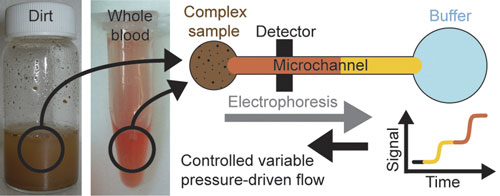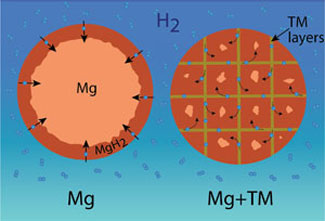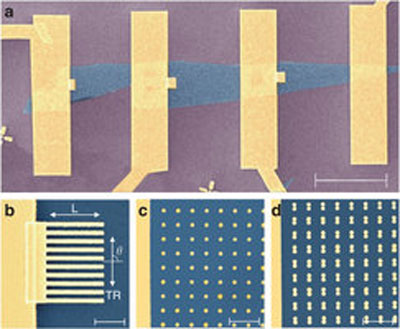 Researchers at NIST significantly extended the reach of their novel microfluidic system for analyzing the chemical components of complex samples. The new work shows how the system, meant to analyze real-world, crude mixtures such as dirt or whole blood, can work for negatively charged components as well as it has in the past for positively charged ones.
Researchers at NIST significantly extended the reach of their novel microfluidic system for analyzing the chemical components of complex samples. The new work shows how the system, meant to analyze real-world, crude mixtures such as dirt or whole blood, can work for negatively charged components as well as it has in the past for positively charged ones.
Aug 31st, 2011
Read more
 With a nod to biology, scientists at the National Institute of Standards and Technology (NIST) have a new approach to the problem of safely storing hydrogen in future fuel-cell-powered cars. Their idea: molecular scale 'veins' of iron permeating grains of magnesium like a network of capillaries.
With a nod to biology, scientists at the National Institute of Standards and Technology (NIST) have a new approach to the problem of safely storing hydrogen in future fuel-cell-powered cars. Their idea: molecular scale 'veins' of iron permeating grains of magnesium like a network of capillaries.
Aug 31st, 2011
Read more
At today's second annual Global Technology Conference (GTC 2011), GLOBALFOUNDRIES announced the winners of its new "Leading in Innovation" awards. Presented to customers who have demonstrated innovative solutions on products ranging from 0.35um non-volatile memories to leading-edge 28nm smartphone processors, the awards showcase the company's collaborative approach to enabling chip designers to deliver a superior end-user experience.
Aug 30th, 2011
Read more
To support Office of Naval Research (ONR) development of hydrodynamically efficient and environmentally non-toxic anti-corrosion materials, Dr. Chang-Hwan Choi, Assistant Professor of Mechanical Engineering at Stevens Institute of Technology, researches nanotechnology with multifunctional superhydrophobic properties that repel water and prevent corrosion in robust and durable ways. Dr. Choi's work has recently been awarded a Defense University Research Instrumentation Program (DURIP) grant that backs this work.
Aug 30th, 2011
Read more
Using advanced theoretical computations, a team of Kentucky scientists has derived a means to "tweak" an inexpensive semiconductor to function as photoelectrochemical catalyst.
Aug 30th, 2011
Read more
This conference will present the first systematic and comprehensive recommendations and analysis on protecting human participants in research on nanomedicine products, including drugs, devices, and gene therapy using nano-vectors.
Aug 30th, 2011
Read more
 A collaboration between the Universities of Manchester and Cambridge, which includes Nobel Prize winning scientists Professor Andre Geim and Professor Kostya Novoselov, has discovered a crucial recipe for improving characteristics of graphene devices for use as photodetectors in future high-speed optical communications.
A collaboration between the Universities of Manchester and Cambridge, which includes Nobel Prize winning scientists Professor Andre Geim and Professor Kostya Novoselov, has discovered a crucial recipe for improving characteristics of graphene devices for use as photodetectors in future high-speed optical communications.
Aug 30th, 2011
Read more
Polyurethane reinforced with carbon nanotubes outperforms currently used materials.
Aug 30th, 2011
Read more
European Commission's Joint Research Centre (JRC), Institute for Health and Consumer Protection defends the need to define engineered nanomaterials for regulatory purposes.
Aug 30th, 2011
Read more
New approach for studying molecules within their natural environment.
Aug 29th, 2011
Read more
Scientists have proposed a new communications scheme that would use silicon wires carrying a constant current to drive electrons from a transmitter to a receiver. By changing its magnetization, a contact would inject electron spin (either up or down) into the current at the transmitter end.
Aug 29th, 2011
Read more
In their search for smaller, faster information-storage devices, physicists have been exploring ways to encode magnetic data using electric fields. One advantage of this voltage-induced magnet control is that less power is needed to encode information than in a traditional system.
Aug 29th, 2011
Read more
Researchers surprised to see twin-induced brittle-like fractures in gold nanowires.
Aug 29th, 2011
Read more
A remarkable effect never witnessed before has been discovered in the ring-shaped stains of tiny dissolved particles ('coffee stains') that develop after a liquid has evaporated. While the particles on the outside of the ring are neatly organized, chaos reigns on the inside of the ring where the particles seem to have collected in a great hurry.
Aug 29th, 2011
Read more
New research into organic semiconductors advances field.
Aug 29th, 2011
Read more
An amorphous-seed mediated strategy has been developed in the Center for Nanoscale Materials Nanophotonics Group for creating bifunctional nanoparticles composed of silver and iron oxide nanodomains. These hybrid particles exhibit unique optical properties due to surface plasmon resonance from the silver and superparamagnetic responses from the iron oxide.
Aug 29th, 2011
Read more
 Researchers at NIST significantly extended the reach of their novel microfluidic system for analyzing the chemical components of complex samples. The new work shows how the system, meant to analyze real-world, crude mixtures such as dirt or whole blood, can work for negatively charged components as well as it has in the past for positively charged ones.
Researchers at NIST significantly extended the reach of their novel microfluidic system for analyzing the chemical components of complex samples. The new work shows how the system, meant to analyze real-world, crude mixtures such as dirt or whole blood, can work for negatively charged components as well as it has in the past for positively charged ones.


 Subscribe to our Nanotechnology News feed
Subscribe to our Nanotechnology News feed